| Listing 1 - 10 of 12 | << page >> |
Sort by
|
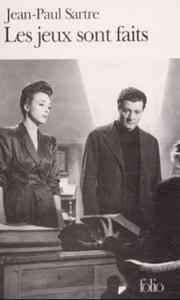
ISBN: 9782070394821 Year: 1996 Publisher: Gallimard,
Abstract | Keywords | Export | Availability | Bookmark
 Loading...
Loading...Choose an application
- Reference Manager
- EndNote
- RefWorks (Direct export to RefWorks)
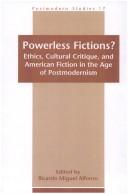
ISBN: 9789004647312 9789042000841 Year: 1996 Publisher: Leiden ;Boston Brill
Abstract | Keywords | Export | Availability | Bookmark
 Loading...
Loading...Choose an application
- Reference Manager
- EndNote
- RefWorks (Direct export to RefWorks)
American fiction --- American novel --- Postmodernism (Literature) --- History and criticism
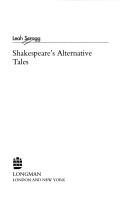
ISBN: 0582244846 Year: 1996 Volume: *3 Publisher: New York ; London Longman
Abstract | Keywords | Export | Availability | Bookmark
 Loading...
Loading...Choose an application
- Reference Manager
- EndNote
- RefWorks (Direct export to RefWorks)
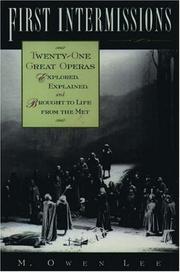
ISBN: 0198025289 1280600217 9786610600212 142374098X 9781423740988 9781280600210 0195092554 9780195092554 0195106490 087910970X Year: 1996 Publisher: New York Oxford University Press
Abstract | Keywords | Export | Availability | Bookmark
 Loading...
Loading...Choose an application
- Reference Manager
- EndNote
- RefWorks (Direct export to RefWorks)
Millions of opera fans tune in faithfully to the Metropolitan Opera's famous Saturday radio series. One of the program's highlights occurs during the first intermission, when invited speakers offer live, stimulating commentary on the opera aired that day. And for the last twelve years one of the most popular guests on this program has been M. Owen Lee, a Catholic priest and classics scholar, who has emerged as a brilliant and engaging speaker with a gift for making opera relevant to modern concerns. Now, in First Intermissions, Father Lee presents twenty-one of his finest radio talks, analyzing some of the best loved operas in the current repertoire, including masterworks by Mozart, Verdi, Wagner, Puccini, and Strauss. This is a book that brims with opera lore, with the love of fine music, and with an abundance of good humor. Father Lee writes brilliantly about the music itself, offering insights into composition that even a novice can grasp and enjoy. But for Father Lee, opera is more than beautiful music. Opera is about the human condition, our capacity for good and evil, our unconscious thoughts and conscious actions, our sorrows and our joys, our stories, our myths, and our personal triumphs and tragedies. It is great art confronting life head on: the conflict between fathers and children in Verdi, the irreversibility of time in Strauss, or the quest for self-realization in Wagner. Father Lee brings the real story of opera to life--great stories that make us see beyond the plot and feel the music as a blow to the heart. What also strikes the reader about Father Lee's style is that it is very intimate, not only sprinkled with personal anecdotes (such as saving pennies in Depression-era Detroit to buy sheet music from Sears and Roebuck), but informed throughout by his open-hearted response to opera's magic. Father Lee's love of opera shines through these pieces, and his enthusiasm is contagious, sending readers straight to their record collections--or the nearest record store--to savor once again the marvels of opera. When Father Owen Lee first appeared on the Metropolitan Opera broadcasts, he was given two criteria. "I could say anything I pleased," he recalls, "so long as (1) it was instantly intelligible to the little old lady in Dubuque and the little old gentleman in Des Moines and (2) it was something no one anywhere, of either sex or any age, had ever thought of before." Whether discussing Puccini's La Boheme or Strauss's Der Rosenkavalier or Gounod's Faust, Father Lee remains utterly original and always in touch with the little old lady in Dubuque..
Operas --- Opera --- Opera plots --- Opera stories --- Operetta --- Stories of operas --- Stories of operettas --- Plots (Drama, novel, etc.) --- Analysis, appreciation.
Book
ISBN: 8424917987 9788424917982 Year: 1996 Volume: 394 Publisher: Madrid : Gredos,
Abstract | Keywords | Export | Availability | Bookmark
 Loading...
Loading...Choose an application
- Reference Manager
- EndNote
- RefWorks (Direct export to RefWorks)
Fiction --- Spanish literature --- anno 1500-1599 --- Spanish fiction --- Roman espagnol --- History and criticism --- Histoire et critique --- History and criticism. --- Novel·la grega --- Spanish fiction - Classical period, 1500-1700 - History and criticism. --- LITTERATURE ESPAGNOLE --- ROMAN BYZANTIN
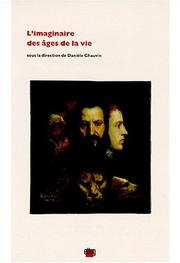
ISBN: 2902709951 9782902709953 Year: 1996 Publisher: Grenoble: Ellug,
Abstract | Keywords | Export | Availability | Bookmark
 Loading...
Loading...Choose an application
- Reference Manager
- EndNote
- RefWorks (Direct export to RefWorks)
Imagination --- Age --- Life cycle, Human, in literature. --- Aging in literature. --- Literature, Comparative --- Themes, motives. --- Aging in literature --- Life cycle, Human, in literature --- -Comparative literature --- Philology --- Themes, motives --- History and criticism --- -Themes, motives --- Comparative literature --- Plots (Drama, novel, etc.) --- Literature, Comparative - Themes, motives. --- Imaginaire --- Vie
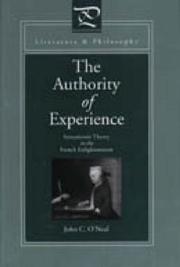
ISBN: 0271015152 0271071737 Year: 1996 Publisher: University Park (Penn.) Pennsylvania State University Press
Abstract | Keywords | Export | Availability | Bookmark
 Loading...
Loading...Choose an application
- Reference Manager
- EndNote
- RefWorks (Direct export to RefWorks)
Sensationism, a philosophy that gained momentum in the French Enlightenment as a response to Lockean empiricism, was acclaimed by Hippolyte Taine as ";the doctrine of the most lucid, methodical, and French minds to have honored France."; The first major general study in English of eighteenth-century French sensationism, The Authority of Experience presents the history of a complex set of ideas and explores their important ramifications for literature, education, and moral theory.The study begins by presenting the main ideas of sensationist philosophers Condillac, Bonnet, and Helvétius, who held that all of our ideas come to us through the senses. The experience of the body in seeing, hearing, smelling, tasting, and touching enabled individuals, as John C. O'Neal points out, to challenge the sometimes arbitrary authority of institutions and people in positions of power. After a general introduction to sensationism, the author develops a theory of sensationist aesthetics that not only reveals the interconnections of the period's philosophy and literature but also enhances our awareness of the forces at work in the French novel. He goes on to examine the relations between sensationism and eighteenth-century French educational theory, materialism, and idéologie. Ultimately, O'Neal opens a discussion of the implications of sensationist thought for issues of particular concern to society today.
Enlightenment --- Empiricism. --- Philosophy, French --- French literature --- History and criticism. --- 0-271-01515-2. --- Authority of Experience. --- Condillac Bonnet and Helvetius. --- Criticism. --- French novel educational theory. --- Hippolyte. --- John C. O'Neal. --- Literary Theory. --- Lockean. --- Philosophy. --- Taine. --- aesthetics. --- empiricism. --- literature education. --- materialism ideologie society. --- moral theory. --- sensationist.

ISBN: 0271071737 9780271071732 9780271042671 0271042672 0271015152 9780271015156 Year: 1996 Publisher: University Park, PA
Abstract | Keywords | Export | Availability | Bookmark
 Loading...
Loading...Choose an application
- Reference Manager
- EndNote
- RefWorks (Direct export to RefWorks)
Sensationism, a philosophy that gained momentum in the French Enlightenment as a response to Lockean empiricism, was acclaimed by Hippolyte Taine as ";the doctrine of the most lucid, methodical, and French minds to have honored France."; The first major general study in English of eighteenth-century French sensationism, The Authority of Experience presents the history of a complex set of ideas and explores their important ramifications for literature, education, and moral theory.The study begins by presenting the main ideas of sensationist philosophers Condillac, Bonnet, and Helvétius, who held that all of our ideas come to us through the senses. The experience of the body in seeing, hearing, smelling, tasting, and touching enabled individuals, as John C. O'Neal points out, to challenge the sometimes arbitrary authority of institutions and people in positions of power. After a general introduction to sensationism, the author develops a theory of sensationist aesthetics that not only reveals the interconnections of the period's philosophy and literature but also enhances our awareness of the forces at work in the French novel. He goes on to examine the relations between sensationism and eighteenth-century French educational theory, materialism, and idéologie. Ultimately, O'Neal opens a discussion of the implications of sensationist thought for issues of particular concern to society today.
Empiricism. --- French literature --- Philosophy, French --- Enlightenment --- Experience --- Knowledge, Theory of --- Rationalism --- History and criticism. --- 0-271-01515-2. --- Authority of Experience. --- Condillac Bonnet and Helvetius. --- Criticism. --- French novel educational theory. --- Hippolyte. --- John C. O'Neal. --- Literary Theory. --- Lockean. --- Philosophy. --- Taine. --- aesthetics. --- empiricism. --- literature education. --- materialism ideologie society. --- moral theory. --- sensationist.
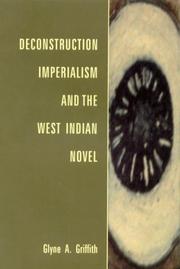
ISBN: 9766400121 Year: 1996 Publisher: Kingston : University of the West Indies,
Abstract | Keywords | Export | Availability | Bookmark
 Loading...
Loading...Choose an application
- Reference Manager
- EndNote
- RefWorks (Direct export to RefWorks)
WEST INDIAN LITERATURE (ENGLISH) --- DECONSTRUCTION (LITERATURE) --- IMPERIALISM --- WEST INDIAN NOVEL --- IDEOLOGY AND LITERATURE --- DELISSER (H.G.) --- HEARNE (JOHN) --- HARRIS (WILSON), 1921 --- -JAMES (CYRIL LIONEL ROBERT), 1901-1989 --- LOVELACE (EARL), 1935 --- -MAIS (ROGER), 1905-1955 --- RHYS (JEAN), 1894-1979 --- NAIPAUL (VIDIADHAR SURAJPRASAD), 1932 --- -LAMMING (GEORGE), 1927 --- -BRATHWAITE (EDWARD KAMAU), 1930 --- -20th CENTURY --- JANE'S CAREER
Book
ISBN: 0262282429 0585336059 9780585336053 9780262282420 Year: 1996 Publisher: Cambridge, Mass. MIT Press
Abstract | Keywords | Export | Availability | Bookmark
 Loading...
Loading...Choose an application
- Reference Manager
- EndNote
- RefWorks (Direct export to RefWorks)
Transgenic plants. --- Crops --- Plant genetic engineering --- Transgenic plants --- Agriculture --- Earth & Environmental Sciences --- Plant Sciences --- Plants --- Genetic engineering --- Plant biotechnology --- Agricultural crops --- Crop plants --- Farm crops --- Industrial crops --- Farm produce --- Plants, Cultivated --- Agronomy --- Crop science --- Plant products --- GE crops (Genetically engineered crops) --- GE plants (Genetically engineered plants) --- Genetically engineered crops --- Genetically engineered plants --- Genetically modified crops --- Genetically modified plants --- GM crops (Genetically modified crops) --- GM plants (Genetically modified plants) --- Novel crops --- Transgenic crops --- Transgenic organisms --- Environmental aspects. --- Environmental aspects
| Listing 1 - 10 of 12 | << page >> |
Sort by
|

 Search
Search Feedback
Feedback About UniCat
About UniCat  Help
Help News
News